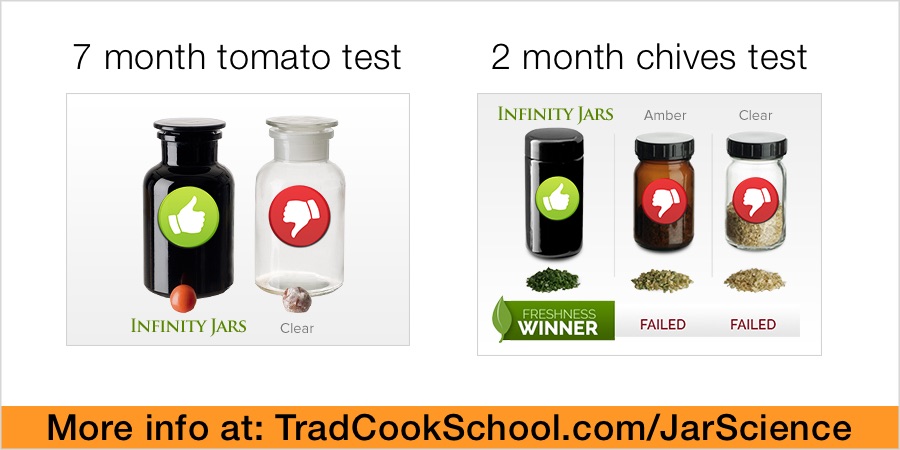
“What’s the best way to store herbs and spices?” asks Julie D. on today’s #AskWardee. I’m sharing my thoughts below!
I broadcast #AskWardee live each Wednesday at 10am Pacific (1pm Eastern) on Periscope and Facebook Live. Both the podcast and video replay of this week’s show are below. Enjoy!
Subscribe to #AskWardee on iTunes, Stitcher, YouTube, or the Podcasts app.
The Question: “What’s the best way to store herbs and spices?”
Julie D. asks:
I think my herbs and spices would last longer if I knew how to store them. What’s the best way to store herbs and spices so they stay potent and viable for as long as possible?
My Answer:
Storage times will vary, but herbs in optimal conditions — fully dry and stored at 60 degrees Fahrenheit or below in air-tight containers — will store for at least a year, and probably more.
Herbs and spices last much longer and stay more potent if stored dark and cool and air-tight.
If storing at room temperature or in fluctuating temperatures or in not air-tight containers, the length of time decreases.
Let’s go over the best options for storage containers now. Because you need containers to keep your herbs and spices (and supplements) potent and fresh for as long as possible!
Options For Storage Containers
When you’re considering storage options, consider 3 factors:
- How often you are using these herbs and spices. For instance, when you’re getting in and out of them often, being able to do so easily is preferred. You’ll see how this matters as we go through the 3 options.
- How much you want to spend on storage containers or methods, or whether you want to use what you have.
- Which herbs and spices are most important to preserve the longest (perhaps you’re using them medicinally) so those you’re willing to make the biggest time or money investment to store.
Keeping these 3 things in mind, here are 3 options for storage of herbs and spices. (And there may be more that are slight nuances of what I’m sharing here; feel free to add your solutions in the comments!)
#1 — Mason Jars or Amber Jars (a.k.a “As Air-Tight As You Can”)
This is the most basic method of food storage, and it will help your dried foods last for a few weeks up to a few months.
- Mason jars. Store your dried foods in mason jars with the metal lids/bands screwed down as tightly as you can, or with the helpful temporary BPA-free white plastic lids.
- Ziploc bags. Double or triple bag your herbs, removing as much as air as you can from each bag. To prevent foods from touching plastic, wrap them in a paper bag, parchment paper, or natural wax paper first. This also keeps the bag clean for easy re-use.
Neither provides an air-tight environment. The herbs will tend to absorb moisture from the air, causing them to become limp and lose potency as the weeks go by.
To increase the effectiveness, put your jars or bags in the refrigerator or freezer. You need to watch out for freezer burn in the freezer; wrapping foods tightly and using more layers around the food helps minimize this.
Another downside of these options is that they don’t block visible light. Light degrades the contents. You can account for this a bit by keeping your jars in a cupboard, but realize that light will hit the contents as you open and close the cupboard.
#2 — Air-Tight Infinity Glass Jars
These Infinity Jars are fabulous and a relatively new find for me. I found them when I was looking for a way to store my maca in a dark, air-tight environment and still be able to access it easily on a daily basis.
I fell in love with the concept, so I’m beginning to use them for more of our herbs and spices now.
Because of the air-tight seal and dark glass that blocks out visible light:
- They are scent proof;
- They preserve freshness;
- They preserve your herbs and spices (or home-filled capsules) for at least 6 months.
This is just if you keep your herbs and spices at room temperature. If you store them in a cooler location, I would venture a guess that things would keep longer (but that is speculation).
At their website, on this page, Infinity Jars shares 2 amazing tests!
First, a test where they put a tomato in one of their jars and a tomato in a clear glass equivalent jar. After 7 months, the tomato in the clear glass had mold and microbiological growth while the Infinity Jars’ tomato wasn’t even drying out and had lost no color (not to mention no mold or bacterial growth).
The other test involved dried chives, one of the most fragile and perishable herbs. In this test, they compared putting dried jars in an Infinity Jar, an amber screw top jar, and a clear glass jar. In the Infinity Jar, the chives were green and fresh, while the other 2 jars chives were decomposing and degrading already as evidenced by their color and crumbliness.
#3 — Vacuum-Sealed Jars
Vacuum seal machines pull the air out of packages of food, then seal them up to prevent air and moisture from getting back inside. Herbs and spices do better in jars than vacuum seal bags (another option that I’m not going into) because the small particles can prevent a good seal on the vacuum seal pouches.
For this method, you need a vacuum seal machine as well as the appropriately sized jar sealer accessory (regular- or wide-mouth). You also need a Mason jar filled with the food being stored (leaving the top 1/2″ to 1″ free) and the appropriately sized lid (not band). Follow the instructions on your vacuum seal machine to seal up the jar. When sealed, the bump in the center of the lid should be depressed (same as when canning), showing that a vacuum seal has been achieved.
When you want to get into the jar, carefully remove the lid so it can be reused again. My preferred method is to use the straight edge of a butter knife to gently lift the lid off the jar. A lid that is slightly bent at the edges will work again, but if a lid gets too damaged, it is better not to trust it to hold a good seal.
The downside of this is that you have to redo the vacuum seal over and over. Of course the upside is that once you invest in the machine and accessory, you can use your Mason jars over and over. It’s potentially less expensive.
The Bottom Line — My Top Choices
Long-term storage of dried herbs and spices. My choice for herbs and spices that I “put up” from garden harvest is to keep them in vacuum-sealed Mason jars in a dark, cool location. It’s the less expensive and most adequate option for foods we store long-term and those we get into frequently. Of course, one could use the Infinity Jars here if the expense was not a concern.
Herbs and spices (and supplements like maca) that we use on a daily basis. My pick for the best way to store spices and herbs that I want to get in and out of constantly is Infinity Jars. This is because they provide an air-tight and dark environment, and I can easily get in and out of the jars on a daily basis.
Links Mentioned:
- Free Traditional Cooking Video Series
- Infinity Jars
- Infinity Jars tests
- Food Saver Vacuum Seal Machines
- Jar Sealer Accessory
- Maca
What Is The #AskWardee Show?
The #AskWardee Show is the live weekly show devoted to answering your niggling questions about Traditional Cooking: whether it’s your sourdough starter, your sauerkraut, preserving foods, broth, superfoods or anything else to do with Traditional Cooking or your GNOWFGLINS lifestyle.
I share tips and resources, plus answer your questions about Traditional Cooking!
The Details
When: Wednesdays at 10am Pacific / 1pm Eastern
Where: @TradCookSchool on Periscope or Traditional Cooking School on Facebook
What If You Can’t Make It?
Don’t worry. You can catch the replays or listen to the podcast!
- Come back here to AskWardee.TV; all replays will be up within hours of airing live; the print notes are always posted at the same time I go live.
- Follow @TradCookSchool on Periscope or Traditional Cooking School on Facebook to view the replay.
- Subscribe to the #AskWardee podcast on iTunes, Stitcher, YouTube, or the Podcasts app. While you’re there, be sure to leave a rating and review!
Want To Get YOUR Question Answered?
Here’s how to submit your question. If we answer it on #AskWardee, you’ll get a gift!
Or, you can…
- Tweet your question to @TradCookSchool on Twitter; use hashtag #AskWardee
- Send an email to wardee at AskWardee dot tv — add #AskWardee to your email so I know it’s for the show
Please do NOT add future questions for #AskWardee to the comments of this post because they might get missed!
In your opinion, what’s the best way to store herbs and spices? What works best for you?
...without giving up the foods you love or spending all day in the kitchen!

2 free books:
Eat God's Way
Ditch the Standard American Diet, get healthier & happier, and save money on groceries...
We only recommend products and services we wholeheartedly endorse. This post may contain special links through which we earn a small commission if you make a purchase (though your price is the same).




We had so many different herbs for awhile that I started to store ours using hanging folders in a small filing cabinet. We leave them in the original containers that were shipped from Mountain Rose Herbs or Azure Standard, double bag them, and alphabetize them. It’s quirky, but it works for us.
Thats a new one! Thanks for sharing
Elisabeth ~ I love it! Quirky but awesome. 🙂 Thanks for sharing!
I get mine from the bulk department at our co-op. I reuse the glass spice jars I already have. I do peel or cut off the bar code, though, so they know it is a refill and I don’t pay for the jar twice. I also use masking tape to make a new label if I am filling an oregano jar with parsley, for example. Actually, I use masking tape and a sharpie marker to label everything that needs one. Leftovers in the fridge are much more manageable that way.
This was very informative, thank you! I buy herbs in bulk to blend and make teas to sell and thought the resealable mylar was a good option for storing…it keeps them dark anyway?.. But I guess the better solution would be vacuum sealed jars..i have all the attachments; just wonder if I can store as many as efficiently in the cabinet I have them in…time will tell, when I get everything transferred.
Hi, Mickey!
I’m glad the post was helpful, and yes — please let us know how it works!
Sonya, TCS Customer Success Team